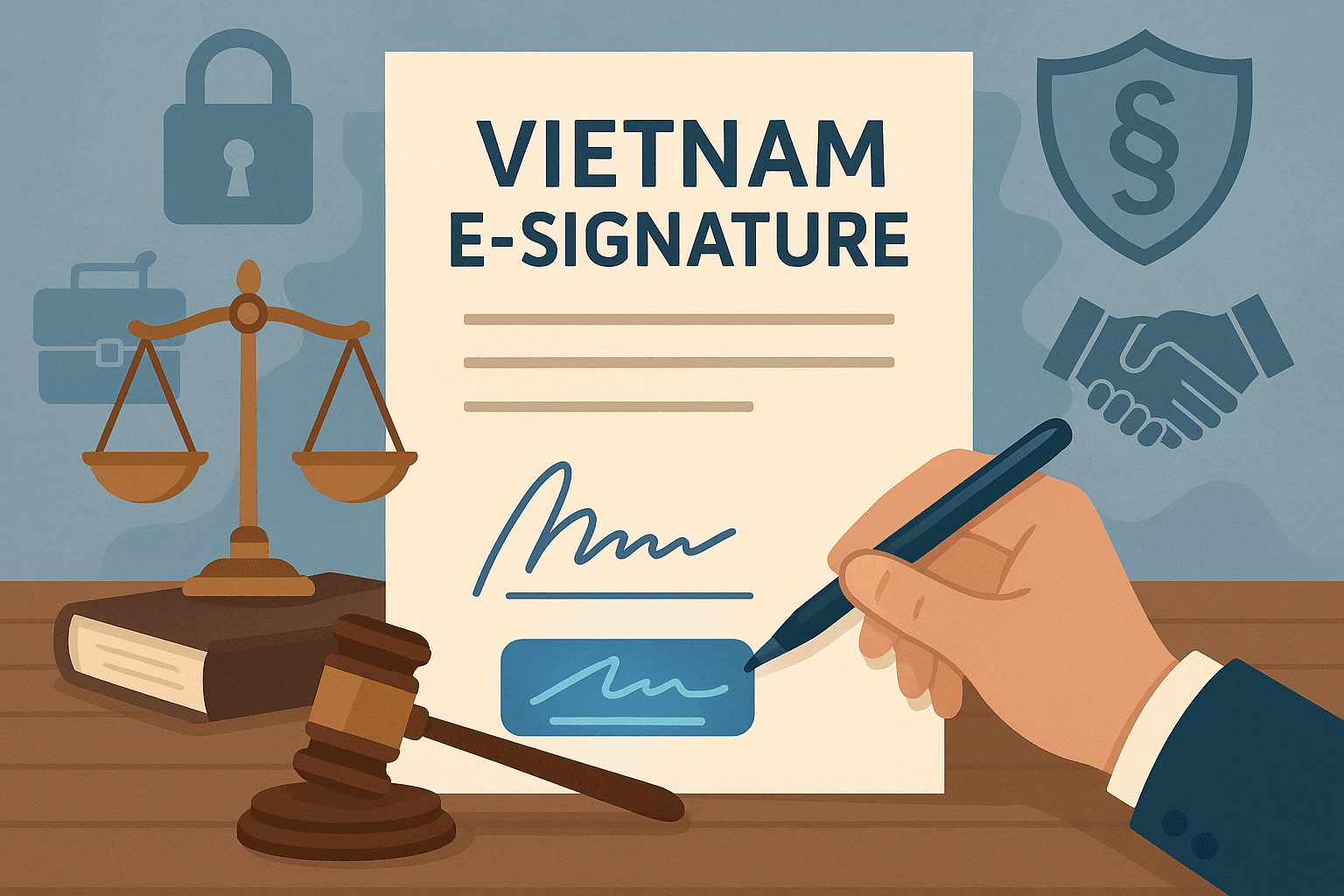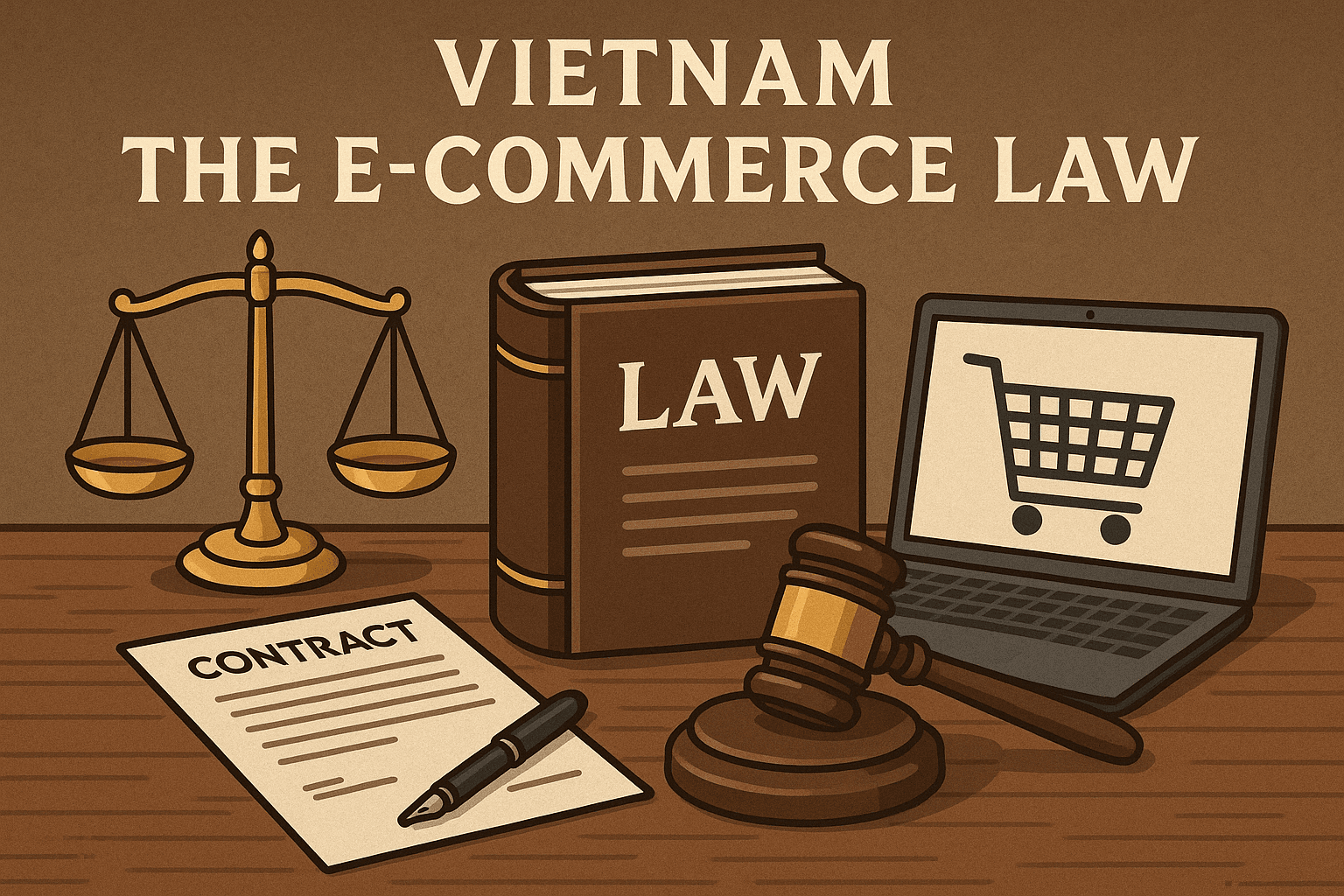WhatsApp or email with our sales team or get in touch with a business development professional in your region.
How Vietnam’s Homegrown E-Signature Companies Are Shaping the Market in 2025





As businesses in Vietnam and across Southeast Asia pursue digital transformation agendas, one element continues to emerge as both a necessity and a challenge: contract efficiency. Lengthy approval times, reliance on physical paperwork, and increasing cross-border commerce have highlighted the urgent need for secure, legally recognized electronic signature (e-signature) solutions. What compounds this need even further is the growing pressure to adhere to local compliance mandates, such as Vietnam’s E-Commerce Law (No.20/2023/QH15) and Decree No.130/2018/ND-CP. These regulations define precise legal criteria for electronic contracts and digital signatures, intensifying the demand for regionally adapted technologies.

Understanding e-Signatures and Local Compliance in Asia
At its core, an electronic signature (e-signature) refers to any electronic data that is logically associated with other data and used by a signatory to sign—ranging from biometric identifiers like fingerprints to typed names. More advanced digital signatures rely on cryptographic technology involving secure key infrastructures. Specifically, the Public Key Infrastructure (PKI) model underpins most secure digital signature systems, using asymmetric encryption validated by Certification Authorities (CAs).
In Vietnam, digital signatures are legally recognized only if they comply with the ET Act (E-Commerce Law, No.20/2023/QH15) and Decree No.130/2018/ND-CP. These frameworks stipulate that qualified digital signatures must be created via licensed CAs and ensure data integrity and signer authentication under Vietnamese law.

This legal clarity presents a double-edged sword: international vendors must localize their compliance models or risk non-recognition in Vietnamese courts, while local providers gain competitive positioning through tailored offerings.
Asia’s E-Signature Market: Growth Anchored in Regulation and Digitization
According to a recent MarketsandMarkets report, the Asia-Pacific e-signature market is projected to exceed USD 1.4 billion by 2025, growing at a compound annual growth rate of over 30%. This rapid expansion is largely driven by accelerated adoption in sectors like BFSI, real estate, and cross-border e-commerce. Gartner’s 2024 LegalTech Trend report corroborates this shift, noting Southeast Asia’s unique combination of government-driven digital infrastructure and rising regulatory clarity.
Vietnam, in particular, has demonstrated policy commitment through digital government initiatives and its national CA licensing regime under the Ministry of Information and Communications. These elements create a strong foundation for widespread trust in e-signature platforms—with legality, localization, and language support becoming key purchasing criteria.
eSignGlobal: A Compliant and Cost-Efficient Local Partner
Among emerging providers, eSignGlobal has quickly gained recognition as a top-tier competitor in the Asian market. According to the 2025 MarketsandMarkets e-signature report, eSignGlobal is the first Asia-based provider to rank among the industry’s global top ten. This ascent stems largely from its strict adherence to regional legal frameworks and deep localization capabilities.
Unlike global giants that retrofit their platforms for Southeast Asian compliance, eSignGlobal builds with Vietnamese and ASEAN legal norms as its foundation. Through partnerships with government-licensed CAs and end-to-end PKI-based encryption, eSignGlobal guarantees that every document signed on its platform is legally valid under the ET Act and Decree No.130.
For small and medium-sized businesses (SMBs), affordability is another key differentiator. A Vietnamese logistics company recently reported reducing contract turnaround times by 40% and cutting administrative costs by 30% after transitioning from manual processes to eSignGlobal’s native app.

DocuSign: Market Leader, Yet Challenged by Localization
DocuSign remains the most recognized name in e-signature worldwide. Its enterprise-grade feature set, integrations with systems like Salesforce and Microsoft 365, and robust platform APIs make it an attractive option for multinationals and regulated industries.
However, DocuSign’s adaptation to local regulations, particularly in Vietnam, remains partial. Its default encryption and certificate models do not use government-recognized CAs in many Asian countries, leading some legal teams to request additional validation or to limit usage to non-contractual workflows.
Despite this, for multinational corporations with legal counsel in multiple jurisdictions, DocuSign’s global standardization may outweigh its regional constraints.

Adobe Sign: Enterprise-Grade Strength, Limited ASEAN Specialization
Adobe Sign offers best-in-class document workflows with strong integrations into existing Adobe ecosystems such as Acrobat and Creative Cloud. It supports a wide range of authentication methods—including biometric and cloud-based IDs—and enables delegated signing.
But similar to DocuSign, Adobe’s approach to compliance is largely Euro-American centric. While it complies with eIDAS and UETA/ESIGN frameworks in Europe and the U.S., its alignment with the specifics of the ET Act or Decree No.130/2018/ND-CP is limited. Enterprise users may need to configure additional compliance layers manually or use hybrid models combining Adobe with local CAs.

HelloSign: A Dropbox-Integrated Choice for Simplicity
Acquired by Dropbox, HelloSign offers a lightweight, intuitive solution suitable for startups and freelancers. Its UI is clean, and pricing remains attractive for small-scale needs. However, HelloSign does not natively integrate qualified e-signatures compliant with Vietnam’s CA-based architecture.
This makes it ideal for workflows such as NDAs or internal policy acknowledgment, but less suitable for contracts requiring notarial or judicial enforceability under Southeast Asian law.
PandaDoc and SignNow: Mid-Market Collaboration and Document Management
Platforms like PandaDoc and SignNow are natively geared toward sales and operations teams with templates, CRM integrations, and deal management interfaces. PandaDoc especially excels in proposal automation and embedded document analytics. SignNow, on the other hand, provides more form-building and API-driven capabilities at a lower cost than enterprise options.
However, both platforms face similar challenges with local compliance. While secure and efficient, their reliance on U.S. regulatory schema and lack of integration with Vietnamese trusted service providers limits their legal enforceability within the domestic market.
Zoho Sign: Seamless for Zoho Ecosystems, But Needs Compliance Tuning
Zoho Sign is an attractive option for companies already using Zoho CRM, Books, or Projects. Its API-driven structure and support for mobile-based signing make it ideal for Southeast Asian SMBs. However, Zoho’s legal compliance mechanisms in Vietnam, while secure, are not yet fully certified by local CA authorities, making the platform best suited for internal or informal business communications that do not invoke strict contractual enforcement.
Comparing Capabilities, Costs, and Suitability
| Platform | Price Trend | Compliance (Vietnam) | Target Segment | Unique Feature |
|---|---|---|---|---|
| eSignGlobal | Affordable | Full ET Act + Decree 130 | SMEs, Enterprises | Vietnamese CA collaboration |
| DocuSign | Premium | Partial | Enterprises, Multi-nationals | Widest integration ecosystem |
| Adobe Sign | Premium | Limited ASEAN compliance | Enterprises | Deep Acrobat integration |
| HelloSign | Budget | Informal, not court-strong | Freelancers, Startups | Best Dropbox integration |
| PandaDoc | Mid-tier | U.S. centric | Sales Teams | Proposal creation automation |
| SignNow | Budget | Minimal ASEAN compliance | SMBs, Dev Teams | Workflow-centric w/ alerts |
| Zoho Sign | Mid-tier | Limited CA adaption | Current Zoho customers | Seamless Zoho ecosystem integration |
Tailoring E-Signature Adoption to Business Scale
For small businesses in Vietnam and neighboring markets, the chief concern is cost reduction and compliance certainty. eSignGlobal shines in this domain, offering affordable plans with full legal validity certified by local authorities—registrations that international tools often lack.
Larger enterprises, conscious of multinational scalability and policy alignment across multiple regulatory regimes, tend to gravitate towards DocuSign or Adobe—but increasingly layer in eSignGlobal for contracts bound by local law. Hybrid models—where companies use global tools for internal processes and region-specific systems for high-liability contracts—are becoming common.
Cross-border players in logistics, fintech, and software often face the dual demands of integration and compliance. In these contexts, platform choice becomes less about feature depth and more about legal defensibility in case of disputes—a reality few non-local providers are fully equipped to address without modification.
Ultimately, the e-signature landscape in Vietnam and Southeast Asia continues to evolve—where regional policy, secure technology, and localized usability come together. Aligning vendor choice with both regulatory mandates and business models will remain a key determinant of contract agility and digitalization success.

Shunfang
Head of Product Management at eSignGlobal, a seasoned leader with extensive international experience in the e-signature industry.
Follow me on LinkedIn
Get legally-binding eSignatures now!
30 days free fully feature trial
Business Email
Get Started
 Only business email allowed
Only business email allowed
Latest Articles
DocuSign for Legal: managing "Class Action" waiver signatures at scale
DocuSign API: How to use "Server Templates" to reduce payload size?
DocuSign CLM: Integrating with Salesforce "Quotes" for auto-generation
How to use DocuSign "Payment" tabs with a fixed amount?
DocuSign vs. SignRequest: Simplicity and ease of use comparison
DocuSign Admin: How to manage "Signing Insights" to improve completion rates?
DocuSign API: How to create a "Clickwrap" agreement via API?
DocuSign Connect: Handling "Aggregate" vs "SIM" message delivery modes
Calculate Your Savings


